Fiscal frameworkpublished at 14:16 GMT 10 February 2016
SNP MSP Stuart McMillan goes on the same issue, asking the government what progress it has made in finding an agreement on the fiscal framework.
PLEASE SCROLL DOWN FOR FULL TEXT COVERAGE
Scotland’s new Chief Constable, Phil Gormely appeared before the Public Audit Committee
Finance, constitution and economy ministers took the hot seat for portfolio questions
Labour led a debate calling on education spending to be protected in real terms over the next five years
Labour MSP Margaret McCulloch led a member’s debate marking International Day of Zero Tolerance for Female Genital Mutilation.
Craig Hutchison and Colin Bell
SNP MSP Stuart McMillan goes on the same issue, asking the government what progress it has made in finding an agreement on the fiscal framework.
The principle of "no detriment" contained in the Smith Commision devolution agreement is unworkable in practice, a leading economist has said.
The agreement states that neither the UK or Scottish governments should suffer financially from policy decisions made by the other once the new powers come into force.
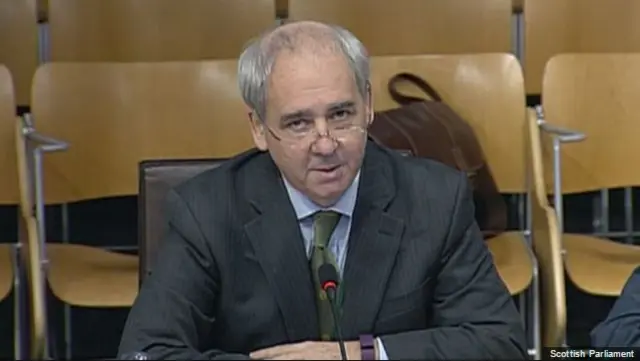 Image source, Scottish Government
Image source, Scottish GovernmentProf David Bell has acted as an economic adviser to both the Scottish and UK governments
But Prof David Bell said it had "huge potential for dispute".
And he said no similar principle was in place anywhere else in the world.
Prof Bell was speaking to MSPs on Holyrood's Devolution (Further Powers) Committee as representatives of the two governments met in London for further talks on the fiscal framework that will underpin the Scotland Bill.
Finance Secretary John Swinney says the proposals not to use the indexed deduction per capita would result in a loss to the Scottish Parliament of up to £7bn over a 10 year period.
Mr Swinney again reiterates he will not sign up to a deal that is unfair to Scotland.
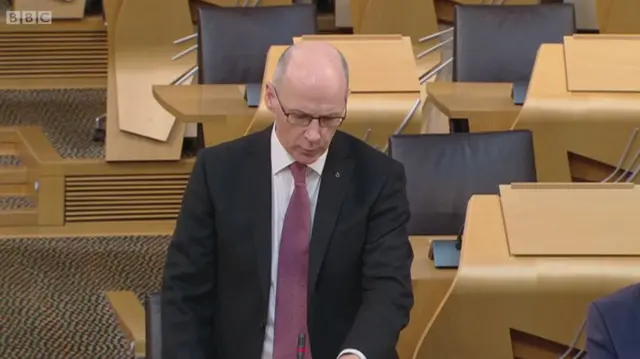
He says this is a key moment in the fiscal framework negotiations.
The deputy first minister says the no detriment principle is vital.
Crunch talks aimed at ending a dispute over the financial arrangements to accompany the Scotland Bill have broken up without agreement.
Deputy First Minister John Swinney and UK Treasury minister Greg Hands met in Edinburgh.

New financial powers, including on tax and borrowing, are due to be handed to Holyrood
The row concerns how much should be cut from the block grant once Scotland gains new tax powers.
Both the Scottish government and the UK Treasury said they would continue to seek a solution.
SNP MSP Kenneth Gibson asks what the impact on Scotland's future budgets would be of not adopting the indexed deduction per capita method as the block grant adjustment mechanism in the fiscal framework.
Labour MSP Hanzala Malik asks the Scottish Government what assessment it has made of how the reduction in the local government budget settlement could impact on the economy and inequality.
Energy Minister Fergus Ewing says there are challenges but opportunities.
Mr Ewing says Aberdeen and the North East are vital to driving economic growth in Scotland.
He cites the City Deal investment.
The north east of Scotland has been allocated £504m of funding over the next 10 years to improve infrastructure and attract jobs.
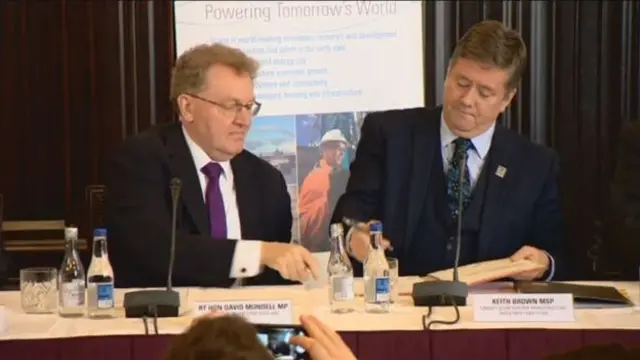 Image source, bbc
Image source, bbcThe agreement between the UK and Scottish governments was signed by David Mundell and Keith Brown at a ceremony in Aberdeen
The £250m "City Deal" for Aberdeen will see the UK and Scottish governments jointly invest in the area.
Separately, the Scottish government has promised £254m for key infrastructure projects in Aberdeen and Aberdeenshire.
These include better rail links and improvements to the A90 junction at Laurencekirk.
Aberdeen hotels have suffered a 46% one-year drop in revenue per room, as the oil industry downturn has seen business spending cut.
It was the worst performing part of the UK last October, according to a regular survey of 3 and 4 star hotels by accountants BDO.
 Image source, Thinkstock
Image source, ThinkstockScotland was the only part of the UK to see a fall in both occupancy rates and in revenue in the year to last autumn.
Occupancy across Scottish cities fell 5.6% to 81% of capacity. Revenue was down 9.5% to average revenue per room of £51.73.
SNP MSP Mark McDonald asks government what steps it is taking to support the Aberdeen economy.
Finance Secretary John Swinney says he shares concerns with the Labour MSP about the change.
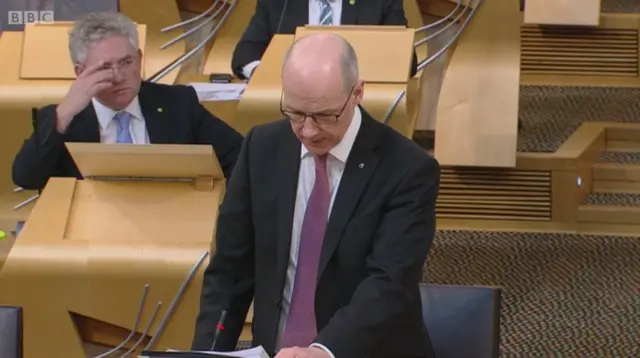
Mr Swinney says 825 jobs are expected to go as offices in Glasgow and Edinburgh are closed.
He says he has made the case to maintain the expertise in these staff.
The UK's tax authority is to close 137 local offices and replace them with 13 regional centres, raising fears over job losses.
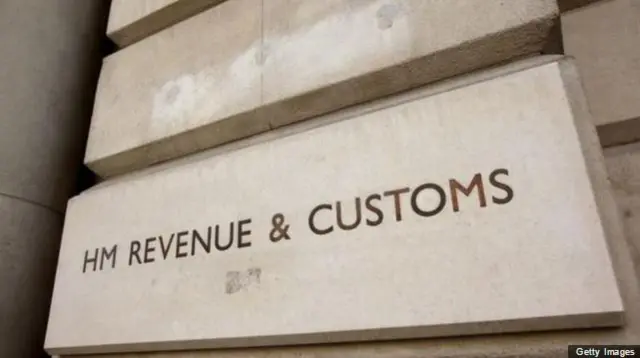 Image source, Getty Images
Image source, Getty ImagesThe closures will be complete by 2027, according to HM Revenue and Customs (HMRC), but the new centres will be open in the next five years.
Towns and cities hosting the new offices include Cardiff, Glasgow, Edinburgh, Bristol and Croydon.
The plan comes as HMRC faces criticism of its call centres.
This week's portofolio questions sees finance, constitution and economy ministers in the hot seats.
Labour MSP Margaret McCulloch gets us underway asking what the impact would be on Scotland's economy of the proposed centralisation of HM Revenue and Customs' offices.
The committee now move into private session.
We'll be back at 2pm with Portfolio Questions which focuses on finance, constitution and the economy.
 Image source, Getty Images
Image source, Getty ImagesThe Scottish Labour Party will then lead a debate entitled 'Scotland's Future Prosperity', where Labour will call for education spending to be protected in real terms over the next five years Labour MSP.

Labour call for education spending to be protected in real terms over the next five years
Margaret McCulloch will then lead a member's debate marking International Day of Zero Tolerance for Female Genital Mutilation
The MSPs will now consider the Scottish government's Annual Report on the Use of Settlement Agreements 2014/15.
The committee will now consider a response from the Scottish government to the Committee's report entitled "Report on Scotland's colleges 2015".
SNP MSP David Torrance asks about the SPA's VAT liability of £26.7m and asks the chief constable if, in his previous experience, does any other Police Authority in the UK pay that.
Police Scotland's Chief Constable Philip Gormley says: "No they don't."
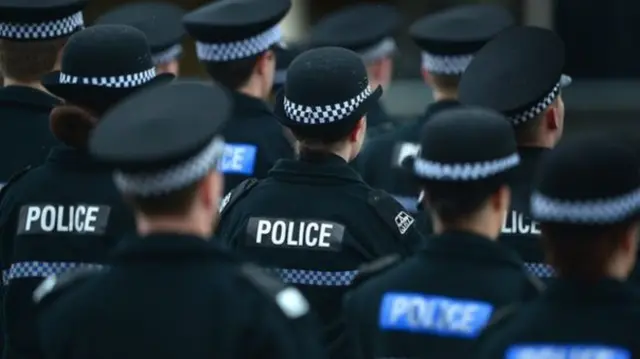 Image source, bbc
Image source, bbcPolice Scotland is the only force in the UK that has to pay VAT
Since Scotland's police services were brought under one single force the organisation has been ineligible for VAT refunds.
This has been criticised by several MSPs and the former Chief Constable Sir Steven House.
Speaking at the Scottish Police Authority's annual conference last April, First Minister Nicola Sturgeon said Police Scotland should be exempt from paying VAT - like all other UK forces. The bill adds £23m each year to its costs.
Mr Martin says the Scottish government would have been aware of the Audit Scotland recommendation in 2012-13 that the board member's expenses should have been updated.
The Labour MSP asks what role the government played in this.
Paul Johnston, the Scottish government's Interim Director-General Learning & Justice, says the recommendation was for board member's to work a maximum of 10 days in a month, but there was an onerous workload in the transition period to a single force.
The process has been tightened up says Mr Johnston.
Committee convener Paul Martin asks Mr Foley if he is personally responsible for ensuring the action points in the Audit Scotland report are implemented.
Mr Foley says he is and will ensure that the action points will be put in place.
Mr Martin asks if Mr Foley has been the accountable officer since 2013-14 and asks why the Audit Scotland recommendations on board members expenses were not carried forward.
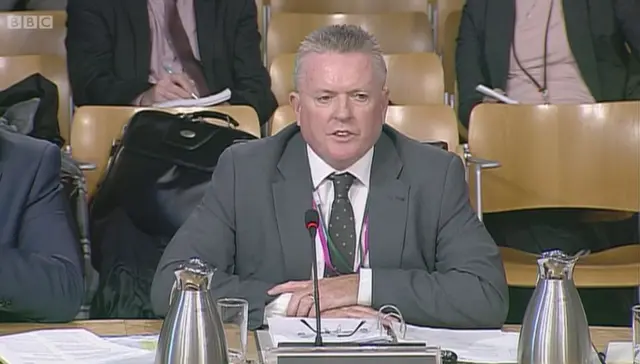
Scottish Police Authority chief executive John Foley
The chief executive for Scottish Police Authority says the policy was not updated to the exact standards that it should have been and that was his responsibility.
Mr Martin asks what confidence the Public Audit Committee can have in Mr Foley having responsibility for Police Scotland's £1bn budget, when he could not implement simple Audit Scotland guidelines.
The chief executive for Scottish Police Authority says: "I do believe the committee should have confidence in me."
Labour MSP Mark Griffin asks about the lack of clarity around the £21m of reform funding.
Paul Johnston, the Scottish government's Interim Director-General Learning & Justice, says Police Scotland make cases for the funding.
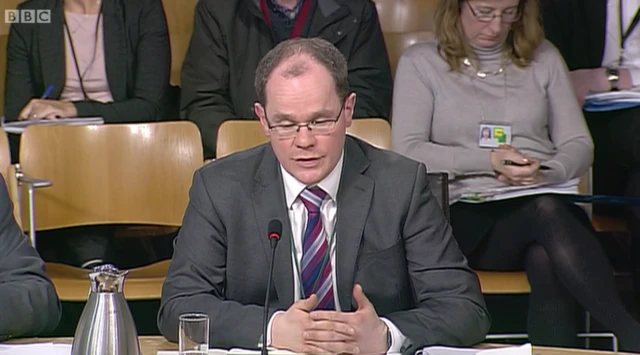 Image source, bbc
Image source, bbcScottish government's Interim Director-General Learning & Justice Paul Johnston
Mr Johnston says the government then disburses the funding.
He raises the thorny issue of VAT and Police Scotland.
Mr Johnston says there should have better breakdown of the way the £21m of reform funding was used.
He insists he the government is very clear about how the reform funding was spent.
Scottish Police Authority chair Andrew Flanagan says 90% of costs for SPA and Police Scotland are staff or payroll related.
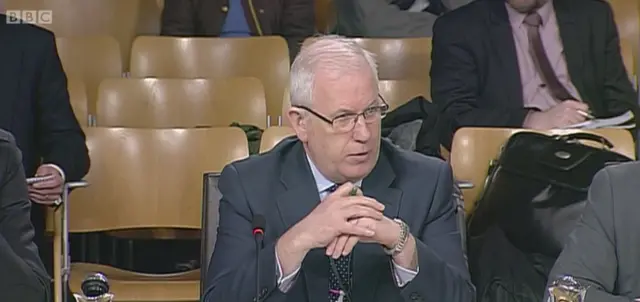
Mr Flanagan says they will need to trim down the amount of cash they held in reserve.